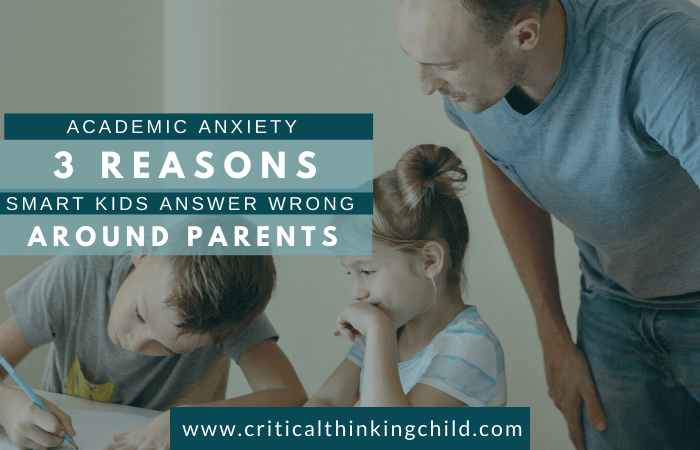Have you ever visited your child’s classroom only to watch them get quiet, frustrated, or angry? Maybe they get every question wrong or struggle with the activity they’re working on. Or have you asked your child to show you what they’ve learned only to be met with resistance?
As a parent who’s invested in their child’s growth, you want to support them and check in on their progress. But some children clam up when their parents are around. Whether it’s at home during study time or when you sit in on your child’s class, their performance may take an abrupt nosedive around you and other adults.
If this sounds familiar, you’re not alone. There are several possible explanations for this phenomenon, and plenty of ways to combat it!
Struggle #1: Your child is scared to make mistakes.
It might seem counter-intuitive, but failure is a part of the learning process. When it comes to developing strong analytical and critical thinking skills, mistakes are actually a good thing. Odds are, your child makes mistakes in their learning every single day, all of which pave the way for more concrete learning.
As parents, we sometimes put too much emphasis on helping our child arrive at the right answer the first time, rather than allowing them to explore the process and think creatively. It sounds strange, but too much help can actually hinder your child’s learning, making them scared to take risks or make mistakes. Unsolicited advice, it can actually make your child more anxious. Kids who are high-achieving are affected by this even more; since they’re used to doing well, the fear of failure can be paralyzing.
Try to remember to only offer advice or help if your child explicitly asks for it. It may be hard to take a step back at first — especially if you see them making mistakes — but in the long run you are empowering your child and fostering their independence.
Struggle #2: They know you’re nervous or stressed.
If your child is particularly empathetic, they may pick up on your mood to the point where it impacts their performance. For example, if you’re stressed about how well your child is doing academically you may unwittingly transfer it to your child through the questions you ask, your tone of voice, and even body language.
To keep this in check, do your best to manage your own stress in whatever way is best for you. Try to meditate, go for a jog, or listen to some calming music. The calmer you are as a parent, the easier it will be for your child to remain calm in stressful situations.
Struggle #3: Your child feels over-managed
Most children work hard to make their parents’ proud. Often, they’re very aware of their parents’ expectations and avoid disappointing them at all costs. Busy schedules, high expectations, and a lack of play time can contribute to poor performance at home.
To combat this, check in regularly with your child about how they are feeling about their schedules. Some events like performances at school are unavoidable, but if your child is constantly stressed by an optional activity, it may be worth re-evaluating their interest in the activity as a whole.
In addition to your child’s overall schedule, take a look at the environment you’re creating around learning activities. Do you have a specific area of the house set up for studying? Are games and collaborative activities a part of the learning process, and how involved are you personally? If your child isn’t accustomed to learning around you they may feel extra nervous when you are around.
Work together to overcome performance anxiety
At the end of the day, you want what’s best for your child, and they likely want to perform at their best. To help make this happy, it’s important to help them become comfortable with studying, learning, and growing while you’re present. It may not happen overnight, but it can happen. Make it fun, show up frequently, and allow your child to learn from their mistakes. Before you know it, they’ll be begging to show you what they’ve learned.
Sources Used:
https://www.mentaltoughnesstrainer.com/parents-role-in-their-kids-sports-performance-anxiety/



